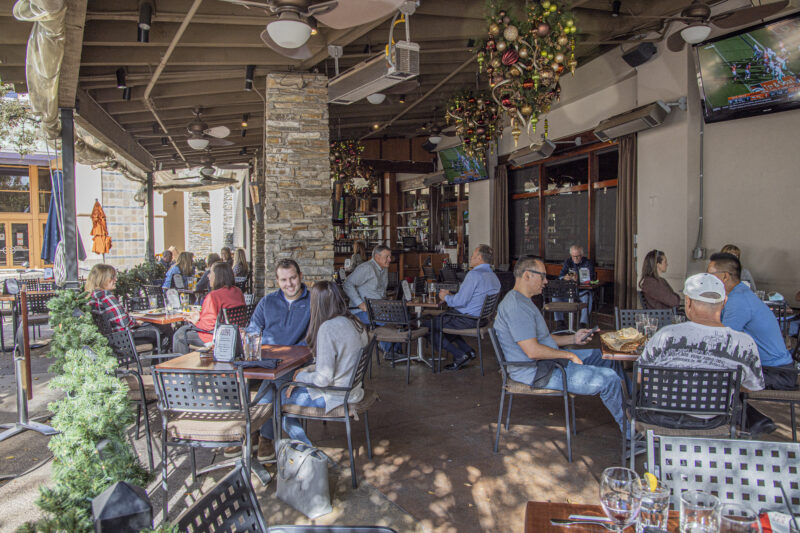After last week’s court ruling that deemed Los Angeles County officials acted “arbitrarily” in banning outdoor dining, a restaurant class-action lawsuit against the county and California over fees and permit refunds is underway.
The complaint asks the county and state to reimburse restaurants for liquor licenses, health permits and state tourism assessments they have had to pay this year amid everchanging COVID-19 safety measures and closures.
L.A.-based attorneys Brian Kabateck, Shant Karnikian and Marina Pacheco filed the case Monday on behalf of gastropub 33 Taps Hollywood and “on behalf of all others similarly situated,” meaning other restaurants in L.A. County can join the lawsuit, according to Gina Fernandes, media relations director with Juris Productions for the lawyers.
“This is the beginning of the litigation but this is to let restaurants know that they should consider joining,” she said.
The complaint alleges that the county and state failed to provide restaurants with refunds for fees and other charges paid even though many had remained closed due to government orders.
“Despite requiring the closure and/or severely limiting the operating ability of these businesses, the county and state continued to charge the businesses permit and licensing fees, as well as late charges,” reads the complaint.
In a prepared statement issued Monday, Kabateck said plaintiffs want the state and county to reimburse all restaurants that have followed the law.
“We’re talking a couple of thousand dollars for the county permit and a couple of thousand dollars for the alcohol permit depending on the size of the restaurant and we recognize that, on an individual basis, it’s not a lot of money for these restaurants but even returning a few thousand dollars right now can make the difference between them succeeding, laying people off or not laying people off,” said Kabateck.
Walter Schild, who owns 33 Taps Hollywood, said he is facing late charges despite having had the restaurant closed.
“I’m being charged late fees up to 50% for failing to pay even though my restaurant has been closed for all but a month since mid-March,” said Schild. “We’ve been pleading with lawmakers for fee relief and now we have no choice but to file a lawsuit.”
The class action comes after the California Restaurant Association filed a lawsuit against the county Public Health Department following its Nov. 25 health officer order closed outdoor dining and required restaurants to only offer delivery or takeout options.
On Dec. 8, L.A. Superior Court Judge James Chalfant ruled that county health officials acted “arbitrarily” when issuing the ban, citing a belief that outdoor dining posed a danger to the public amid a surge in COVID-19 figures.
“By failing to weigh the benefits of an outdoor dining restriction against its costs, the county acted arbitrarily and its decision lacks a rational relationship to a legitimate end,” read Chalfant’s ruling.
The decision, however, does not mean dining in person can return, even though the dining ban is set to expire on Wednesday, because L.A. County is currently under the state’s regional stay-at-home order. California’s order is expected to remain in place at least through Dec. 27.
On Saturday, county Public Health officials issued a statement in response to the court ruling:
“The ruling incorrectly analyzed Public Health’s decision-making process that went into its Nov. 25 order, which included a temporary suspension of outdoor dining at restaurants and a return to takeout and delivery only,” officials said in a prepared statement. “Public Health professionals always, and especially during the COVID-19 pandemic, have the obligation to create effective interventions that prevent and control the spread of communicable disease. When making its order, Public Health knew that new COVID-19 cases and hospitalizations within the county were beginning to surge.”
Pleased with last week’s court ruling, California Restaurant Association president and CEO Jot Condie issued a statement on the class action lawsuit, saying reimbursement of fees would help restaurants stay afloat.
“Even when the restrictions are lifted, the devastating impact on the restaurant industry will extend for years,” said Condie. “Restaurants have not received any form of relief. Easing fees would help enable establishments to stay open and keep vulnerable workers employed.”
On Tuesday, the Los Angeles County Board of Supervisors is expected to meet with legal counsel for a closed session meeting to discuss the California Restaurant Association lawsuit.








